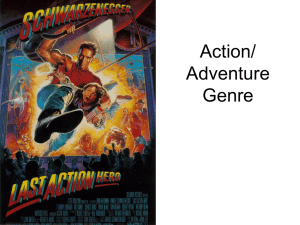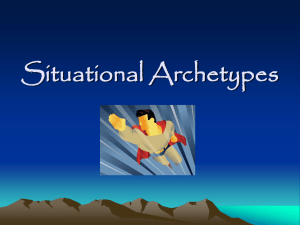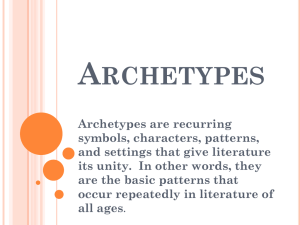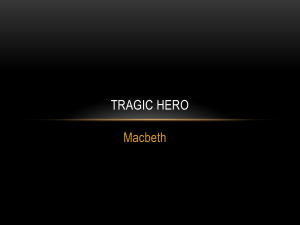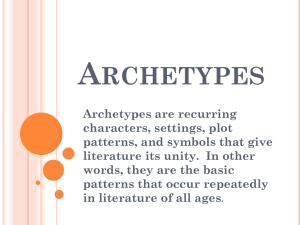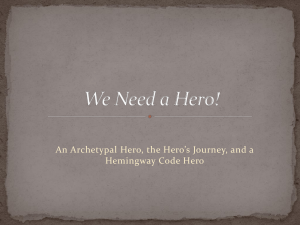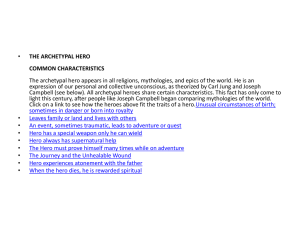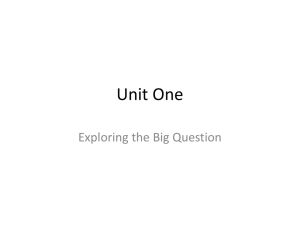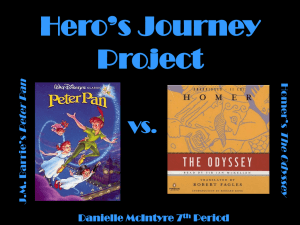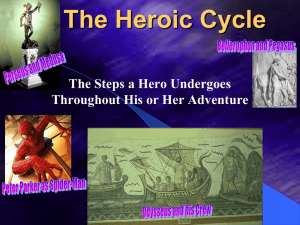Notes: "Epic Journey 9 Steps to Success"
advertisement
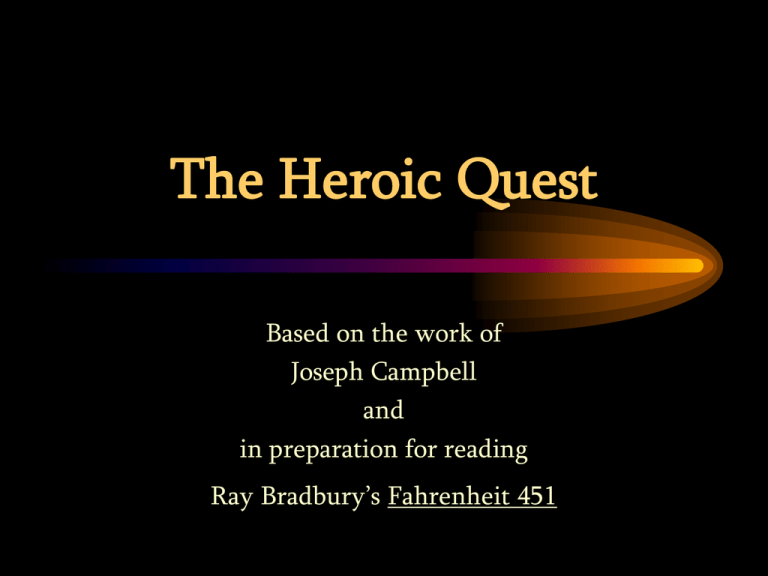
The Heroic Quest Based on the work of Joseph Campbell and in preparation for reading Ray Bradbury’s Fahrenheit 451 Joseph Campbell • 1904 – 1987 • Mythologist: one who studies myths and legends in different cultures • Used archetypes to explain why patterns of stories appear in all cultures, regardless of time or place. A heroic text structure The Hero With a Thousand Faces (1949) • Campbell studied hundreds of heroes from different times and cultures. • During his study he recognized a common text structure for every hero. • This text structure appears in Native American, ancient Greek, African, Norse, Christian, Jewish, Hindu, and Asian heroic tales. • Campbell called this text structure the Heroic Quest Three Parts of the Heroic Quest • Part I: Departure—the hero’s journey begins • Part II: Initiation—the hero is tested • Part III: Return—the hero’s journey is complete Part I: Departure— the hero’s journey begins The status quo (the current state of affairs) • Society is in pretty bad shape. • As an audience, we get to see the hero before he/she has done anything heroic. • Hero is typically an unlikely person – Main clue: orphan or person of mysterious birth Part I: Departure— the hero’s journey begins The call to adventure • Fate/providence/destiny reaches out to the hero and offers him/her the quest – The hero may accept or refuse the quest. • If the hero accepts, all is well. • If the the hero refuses, tragedy or disaster strikes the hero personally so that he/she is forced into taking the quest. Part I: Departure— the hero’s journey begins Advice and gifts from a mentor • The mentor may be a variety of people or, as in fantasy, creatures. • Usually grants some gift or ability to hero • Mentor’s advice and gifts allows the hero to be successful during the first part of his/her challenges. D E P A R T U R E Part I Harry Potter Luke Skywalker Peter Parker The status quo Harry leads a boring life living with his aunt and uncle. Whereabouts of Voldemort unknown. Luke leads a boring life living with his aunt and uncle. Galactic civil war. Peter is a bit of a nerd, and has poor self esteem. Leads a boring life with aunt and uncle. The call to adventure Letters from Hogwarts arrive. Hagrid arrives and tells him he’s a wizard. The droids arrive. R2-D2 plays Leia’s distress signal. Ben Kenobi invites Luke to join him. A radioactive spider bites Peter, giving mysterious new powers. How will Peter use them? Gifts from a mentor invisibility cloak, Hedwig the owl his father’s lightsaber, slight training in The Force “With great power comes great responsibility.” Simba Simba is a young and naïve cub who is living a boring life on the African plain Evil Uncle Scar kills his father, leaving him an orphan with no home. Hakuna Matata, Realizing he is like his Dad Part II: Initiation— the hero is tested Minor challenges • Hero must go through several minor challenges first. • Bring out the hero’s qualities, often previously unknown, even to the hero. • Success proves to others (and the hero) that he/she is capable of great potential. Part II: Initiation— the hero is tested Mentors true and false • The hero will meet other mentors during the course of the heroic quest. – Some will be true, honest, and helpful. – Others will see the hero’s potential and try to use him/her as a tool in their own evil plans. • One of the hero’s greatest struggles is in learning whom to trust and why. Part II: Initiation— the hero is tested Isolation of the hero • Just before the final fight, the hero is separated from his/her friends. • The heroic quest demands that the hero must complete the final challenge without any help. Part II: Initiation— the hero is tested The supreme ordeal • Ultimate fight with the villain, usually to the death. – In narrative structure, this is typically the climax of the story. • Main difference from typical narrative structure: – This fight is not the end—it’s just a step that must be done before the hero can finally finish the quest. Part II I N I T I A T I O N minor challenges Harry Potter Peter Parker rescuing the princess getting used to powers Malfoy, Snape, Ron, Dumbledore Han Solo, Ben Uncle Ben, Aunt Mae, Norman Osborn, Jonah Jameson hero isolated Harry leaves Hermione behind after the potions ordeal. Luke’s allies are picked off until he alone must destroy the Death Star. Peter isolates himself from his friends. The Green Goblin takes Peter away. supreme ordeal (physical climax) Harry faces Voldemort. Luke attacks the Death Star. Spider-man faces the Green Goblin. mentors true/false quidditch, bullies Luke Skywalker Simba Face his family Leave childhood behind Scar Rafiki Nala Faces Scar alone on Pride Rock Defeats Scar Part III: Return— the hero’s journey is complete The last task • The final fight is not enough – Hero must draw upon experience gained during the quest and change the status quo • Hero at last shows personal and spiritual growth gained during the quest – A spiritual climax in addition to the physical climax R E T U R N Part III Harry Potter Luke Skywalker status quo changed Voldemort known to have returned. Harry is more confident and leads an exciting life. The Rebel Alliance achieves a major victory against the Empire. Luke living an exciting life. hero shows wisdom (spiritual climax) Harry figures out Dumbledore’s puzzle of the Sorcerer’s Stone. Luke puts aside the technology and trusts in The Force. Peter Parker Peter is more confident. He’s comfortable around Mary Jane and with his powers. Peter dedicates himself to Uncle Ben’s philosophy. Simba He returns Pride Rock to it’s former glory, and starts a family of his own. Simba realizes that his family does not blame him for his father’s death. Recent texts that used the Heroic Quest as their text structure: • The Star Wars series • The Matrix trilogy • The Lord of the Rings trilogy – Who is the real hero, according to this pattern? It’s probably not who you think! • • • • Spider-Man The Harry Potter series The Lion King Batman "The adventure is its own reward but it's necessarily dangerous, having both negative and positive possibilities, all of them beyond control." —Joseph Campbell
